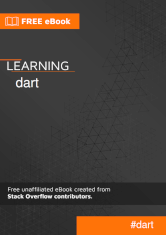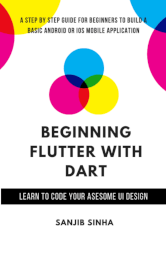Last Updated on May 22, 2022
Dart is a client-optimized programming language for fast apps on multiple platforms. Compile to ARM & x64 machine code for mobile, desktop, and backend. Or compile to JavaScript for the web.
Dart is a multi-paradigm, object-oriented, class defined, garbage-collected, scripting language using a C-style syntax that transcompiles optionally into JavaScript. It supports interfaces, mixins, abstract classes, reified generics, static typing, and a sound type system.
Dart is developed by Google and is used to build mobile, desktop, backend and web applications.
The language is published under the BSD license.
There are very few free books about programming in Dart.
1. Learning Dart by Stack Overflow contributors
 Learning Dart is an unofficial and free dart ebook created for educational purposes. All the content is extracted from Stack Overflow Documentation.
Learning Dart is an unofficial and free dart ebook created for educational purposes. All the content is extracted from Stack Overflow Documentation.
Chapters cover asynchronous programming, classes, collections, comments, control flow, converting data, Dart-JavaScript interoperability, date and time, enums, exceptions, functions, libraries, list filters, pub, regular expressions, and strings.
The book was last updated in February 2017.
The content is released under Creative Commons BY-SA.
2. Beginning Flutter with Dart by Sanjib Sinha
 Are you an absolute beginner with no prior knowledge to any programming language? Still you want to be a mobile application developer? This book will teach you both. You will learn to build an Android or native iOS mobile application, from scratch, using Flutter framework, and along with it, you will learn Dart programming language.
Are you an absolute beginner with no prior knowledge to any programming language? Still you want to be a mobile application developer? This book will teach you both. You will learn to build an Android or native iOS mobile application, from scratch, using Flutter framework, and along with it, you will learn Dart programming language.
This book is incomplete.
3. Essential Dart by Krzysztof Kowalczyk (maintainer)
 Essential Dart is a free book about Dart programming language.
Essential Dart is a free book about Dart programming language.
It’s written to provide clear and concise explanation of topics for both beginner and advanced programmers.
Most examples are linked to online playground that allows you to change the code and re-run it.
The content is based on now abandoned StackOverflow Documentation project like Learning Dart. It has been heavily edited. Content is licensed under Creative Commons Attribution-ShareAlike 3.0.
All books in this series:
| Free Programming Books | |
|---|---|
| Ada | ALGOL-like programming language, extended from Pascal and other languages |
| Agda | Dependently typed functional language based on intuitionistic Type Theory |
| Arduino | Inexpensive, flexible, open source microcontroller platform |
| Assembly | As close to writing machine code without writing in pure hexadecimal |
| Awk | Versatile language designed for pattern scanning and processing language |
| Bash | Shell and command language; popular both as a shell and a scripting language |
| BASIC | Beginner’s All-purpose Symbolic Instruction Code |
| C | General-purpose, procedural, portable, high-level language |
| C++ | General-purpose, portable, free-form, multi-paradigm language |
| C# | Combines the power and flexibility of C++ with the simplicity of Visual Basic |
| Clojure | Dialect of the Lisp programming language |
| ClojureScript | Compiler for Clojure that targets JavaScript |
| COBOL | Common Business-Oriented Language |
| CoffeeScript | Transcompiles into JavaScript inspired by Ruby, Python and Haskell |
| Coq | Dependently typed language similar to Agda, Idris, F* and others |
| Crystal | General-purpose, concurrent, multi-paradigm, object-oriented language |
| CSS | CSS (Cascading Style Sheets) specifies a web page’s appearance |
| D | General-purpose systems programming language with a C-like syntax |
| Dart | Client-optimized language for fast apps on multiple platforms |
| Dylan | Multi-paradigm language supporting functional and object-oriented coding |
| ECMAScript | Best known as the language embedded in web browsers |
| Eiffel | Object-oriented language designed by Bertrand Meyer |
| Elixir | Relatively new functional language running on the Erlang virtual machine |
| Erlang | General-purpose, concurrent, declarative, functional language |
| F# | Uses functional, imperative, and object-oriented programming methods |
| Factor | Dynamic stack-based programming language |
| Forth | Imperative stack-based programming language |
| Fortran | The first high-level language, using the first compiler |
| Go | Compiled, statically typed programming language |
| Groovy | Powerful, optionally typed and dynamic language |
| Haskell | Standardized, general-purpose, polymorphically, statically typed language |
| HTML | HyperText Markup Language |
| Icon | Wide variety of features for processing and presenting symbolic data |
| J | Array programming language based primarily on APL |
| Java | General-purpose, concurrent, class-based, object-oriented, high-level language |
| JavaScript | Interpreted, prototype-based, scripting language |
| Julia | High-level, high-performance language for technical computing |
| Kotlin | More modern version of Java |
| LabVIEW | Designed to enable domain experts to build power systems quickly |
| LaTeX | Professional document preparation system and document markup language |
| Lisp | Unique features - excellent to study programming constructs |
| Logo | Dialect of Lisp that features interactivity, modularity, extensibility |
| Lua | Designed as an embeddable scripting language |
| Markdown | Plain text formatting syntax designed to be easy-to-read and easy-to-write |
| Objective-C | Object-oriented language that adds Smalltalk-style messaging to C |
| OCaml | The main implementation of the Caml language |
| Pascal | Imperative and procedural language designed in the late 1960s |
| Perl | High-level, general-purpose, interpreted, scripting, dynamic language |
| PHP | PHP has been at the helm of the web for many years |
| PostScript | Interpreted, stack-based and Turing complete language |
| Prolog | A general purpose, declarative, logic programming language |
| PureScript | Small strongly, statically typed language compiling to JavaScript |
| Python | General-purpose, structured, powerful language |
| QML | Hierarchical declarative language for user interface layout - JSON-like syntax |
| R | De facto standard among statisticians and data analysts |
| Racket | General-purpose, object-oriented, multi-paradigm, functional language |
| Raku | Member of the Perl family of programming languages |
| Ruby | General purpose, scripting, structured, flexible, fully object-oriented language |
| Rust | Ideal for systems, embedded, and other performance critical code |
| Scala | Modern, object-functional, multi-paradigm, Java-based language |
| Scheme | A general-purpose, functional language descended from Lisp and Algol |
| Scratch | Visual programming language designed for 8-16 year-old children |
| SQL | Access and manipulate data held in a relational database management system |
| Standard ML | General-purpose functional language characterized as "Lisp with types" |
| Swift | Powerful and intuitive general-purpose programming language |
| Tcl | Dynamic language based on concepts of Lisp, C, and Unix shells |
| TeX | Markup and programming language - create professional quality typeset text |
| TypeScript | Strict syntactical superset of JavaScript adding optional static typing |
| Vala | Object-oriented language, syntactically similar to C# |
| VHDL | Hardware description language used in electronic design automation |
| VimL | Powerful scripting language of the Vim editor |
| XML | Rules for defining semantic tags describing structure ad meaning |
